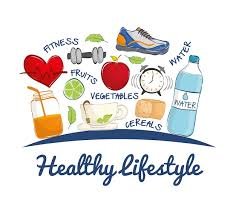Lifestyle plays a crucial role in the health of a person. Poor habits can cause illnesses, disability, and eventually death. Recent medical reports indicate that there is an increase in health issues such as metabolic diseases joint and skeletal disorders and cardiovascular conditions as well as hypertension and obesity. Studies have proven that a healthy lifestyle, including eating a balanced diet, maintaining healthy physical fitness levels, and a balanced weight brings health advantages. Many of us find that our modern lifestyle and the stress it can cause affect our physical social and psychological health. Therefore, knowing the connection and keeping the health balance is essential.

Changed Habits
Not Drinking Enough Water
The water we drink is sixty percent of our body. It’s therefore not surprising that drinking water is beneficial to overall health. Drinking water helps keep your brain alert, your mood steady and your motivation strong. Drinking enough fluids can help keep your skin soft, and your body’s temperature reduces during hot weather, which allows joints and muscles to function more efficiently and rid your body of toxins through the kidneys.
Late Night Dinner
There are several reasons to contemplate moving your dinner time earlier. Researchers believe the long time between meals allows your body to process food more effectively. There has been some research on intermittent fasting (where you break up your meals, and eat them in shorter intervals) and suggests that it can aid in weight loss.
Lack of Exercise
Physical activity can provide numerous health benefits (seriously the list could go on and on). It not only keeps your body looking and feeling fantastic However, regular exercise will help you shed weight and increase your energy levels. Regular exercise can assist in living longer. Furthermore, it ensures your heart is healthy and reduces the chance of developing certain types of chronic illness like breast cancer as well as certain aggressive prostate cancers Improves the flow of blood into your brain which keeps you alert, and aids in controlling blood sugar.
Improper Sleep
It’s obvious that not getting enough rest is a big problem, but what’s the issue? Studies show insufficient rest can affect a variety of issues: it could weaken your immune system, judgment in making sound decisions (you are more likely to make errors) as well and heart health. Lack of sleep can trigger depression, and make it difficult to shed excess weight if you’re trying to lose weight-and it’s more likely to allow yourself to succumb to the sweet temptations of the next day.
Eating Extra Sodium
One of the most effective methods to reduce the amount of sodium you consume is cooking at home with fresh ingredients. Foods from restaurants and processed food tend to be extremely loaded with sodium. To cut down on sodium even more, consider enhancing the flavor of your food at home using spices and herbs instead of salt.
Choosing any food as they “Sound Healthy”
Food labels are becoming more and more prominent. have health benefits listed on the labels. If these claims entice you into buying, remember the fact that simply because a food item does not contain gluten, fat, or carbohydrates doesn’t indicate that it’s healthier. Don’t fall for claims of healthful ingredients by checking these panels as well as ingredient lists for different brands in the same food group. It’s important to know that many of the most nutritious food items available in the supermarket don’t come with packaging or branding, such as fruits and vegetables.
Food cooking in Olive Oil
While olive oil is loaded with heart-healthy antioxidants (called polyphenols) and monounsaturated fats there are occasions that it’s not the most ideal option to cook with. Why? If olive oil is until its smoke point, beneficial components in the oil begin to lose their effectiveness, and possibly harmful compounds begin to develop. If you cook over the highest heat, avoid the olive oil and opt for another oil. Olive oil is a fantastic option for dressing salads or sautéing vegetables at moderate temperature. Moreover, we can add beneficial spices used in our home kitchen to reduce other ailments properly.
Life-related diseases related to lifestyle:
CVD
Cardiovascular disease is a category of heart disorders and blood vessels. These could be characterized by:
Ischaemic heart disease
Stroke
Peripheral arterial disease
Congenital heart disease
The main risks of stroke and heart disease include a poor diet and physical inactivity, smoking consumption, and the harmful use of alcohol. The consequences of these risk factors can be seen in individuals as increased blood pressure, elevated blood sugar, increased blood lipid weight, and overweight. These “intermediate risk factors” are measurable in primary care settings and can indicate an increased risk of having a heart attack heart failure, stroke, and other complications.
Elimination of smoking cigarettes and a reduction in salt consumption in your intake, eating food rich in fruits and vegetables, exercising regularly, and avoiding harmful consumption of alcohol have been found to lower the risk of suffering from cardiovascular heart disease. Health policies that provide conducive conditions for healthy lifestyles that are accessible and affordable are crucial in enticing people to take on and maintain healthy habits.
There are a variety of factors that are the root cause of CVDs. These are manifestations of the main forces that drive cultural, social, and economic transformation – globalization, urbanization, and the aging of the population. Other factors that influence CVDs are stress, poverty, and genetic factors.
Diabetes
It is a condition that is caused when your blood glucose level, also known as blood sugar, is excessively high. Blood glucose is your primary source of energy. It is derived from the food you consume. Insulin is the hormone produced through the pancreas that helps the glucose in food to enter the cells of your body to be used to generate energy. Sometimes, your body isn’t producing enough insulin or any insulin properly. The glucose stays in your blood but does not reach your cells.

It is a metabolic disorder that affects how the body uses food to provide fuel and physical growth. There are four kinds of diabetes Type 1: Gestational and Pre-Diabetes (Impaired tolerance to glucose). Type 2. It is by far the most frequent type of diabetes worldwide which is caused by a variety of risk factors for behavioural change.
As time passes, having excessive levels of sugar in the blood could result in health issues. While diabetes isn’t a cure you can take steps to take control of the effects of diabetes and remain healthy.
What health issues can those with diabetes suffer from?
In time, elevated blood glucose can lead to issues like
heart disease
stroke
kidney disease
Eye problems with the eyes
dental disease
nerve damage
Foot problems
Cancer
The body is affected by cancer in different parts of the body. It’s defined by the rapid development of abnormal cells in the area, and it can also spread to other body parts as well. More than 7 million individuals suffer from cancer every year, and 30 percent of those illnesses are caused by the lifestyle.
Cancer is a broad category of conditions that share one thing they have in common: They all occur when normal cells turn into cancerous cells, which grow and expand.
Difference between normal cells and cancerous cells?
Normally, cells obey instructions that are provided by the genes. Genes define rules that cells must follow for example, when they should begin and stop expanding. Cancerous cells disregard the normal rules that cells observe:
The normal cells split and expand in a controlled way. Cancerous cells multiply rapidly.
The normal cells have been programmed for death (apoptosis). Cancerous cells do not follow these directions.
Normal cells of organs with solid structures stay the same. The cancerous cells can be moved around.
Normal cells don’t develop at the same rate as cancerous cells.
Risk factors for cancer are ones you can manage
Nicotine Smoking cigars, cigarettes, and smoking cigarettes as well as smoking e-cigarettes increases your risk of developing pancreatic, lung, esophageal, and oral cancer.
.
Diet Consuming a lot of fat or high-sugar food items can increase the risk of developing various types of cancer. It is also possible to develop illness if you’re not getting enough exercise.
Environmental exposure to toxins in your surroundings like asbestos pesticides, radon, and pesticides may eventually cause cancer.
Exposure to radiation Ultraviolet (UV) sunlight radiation dramatically increases the risk of developing Skin cancer. Excessive exposure to radiation treatments could also be an underlying risk cause.
Therapy with hormones Women and individuals with AFAB using hormone replacement therapy might be at an increased risk of developing endometrial and breast cancer.
Chronic respiratory illnesses
One of the least-diagnosed illnesses, chronic respiratory diseases (CRD) have been identified as a significant cause of death across the globe, with the majority of deaths occurring in low-income nations. Chronic obstructive lung disease (COPD) along with asthma constitute two of the most common kinds of CRDs.
Chronic respiratory illnesses (CRDs) impact the airways as well as other structures of the lung. The most common are chronic obstructive lung disease (COPD) as well as asthma as well as occupational lung diseases, and hypertension in the pulmonary artery. Apart from smoking cigarettes, Other risk factors include the effects of air pollution, occupational chemicals, and dust, as well as frequent lower respiratory infections in the childhood years. CRDs aren’t curable, However, different forms of treatments that aid in opening the airways and reduce breath shortness can ease symptoms and enhance the quality of life of those living with CRDs. It is the WHO Global Alliance against CRDs (GARD) goal is “a world where all people can breathe easily”. GARD concentrates specifically on the requirements of individuals suffering from CRDs living in low and middle-income nations.
Summary
Lifestyle changes are making our lives rapid. This is a need for time. This also made it more likely and increased our risk of developing diseases. The modern method is preferred by many since they are speedy and produces results. However, if we look at health, the traditional way of living is beneficial. These are skills that focus on active living. If we wish to live a at a healthy and quick pace We need an amalgamation of traditional and modern lifestyle.
Image Source: Freepik


